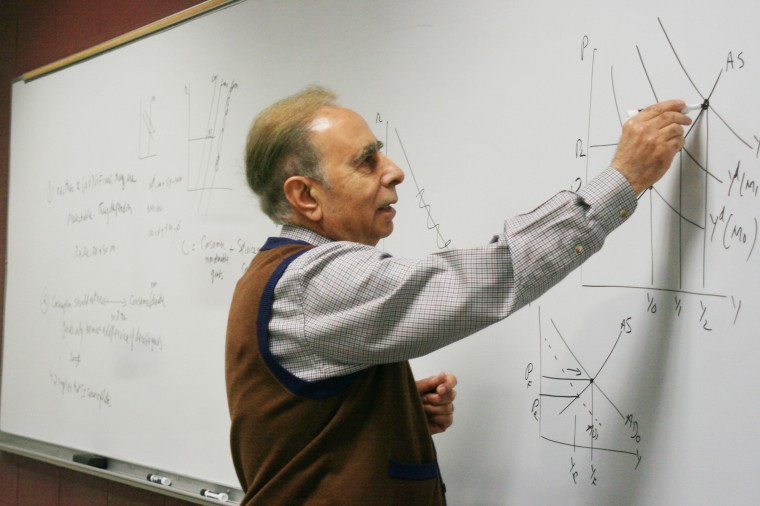No universal teaching method
Economics professor Kahn Mohabbat teaches his ECON 361 class supply and demand in DuSable Hall Tuesday afternoon.
November 6, 2011
Josh Navarro doesn’t like memorizing facts for class.
“I don’t think memorization is really that good,” Navarro, junior business administration major, said. “It seems like as soon as the test is over, it’s like you don’t need it.”
Navarro said he takes a 300-level class that incorporates management, marketing, finance and operations. The teacher lectures students half of the time, but also has the students participate in teams where they discuss ideas under the teacher’s supervision and participation, Navarro said.
The way a class is taught can have an impact on the way some students learn and whether they’re engaged. Kerry Burch, associate professor in educational psychology, said there isn’t a universal method for teaching students.
“I would put it more like what is best for me … rather than some general method that I think everyone else should be adhering to,” Burch said.
Burch said he likes to use Socratic dialogue in his classes to identify cultural contradictions in society and ask questions about social problems. Talking about dialogue, what it means to have a good education, what it means to have a good society and how to improve society if it is wrong form the core questions of his discipline.
“I come at this from a philosophy of education perspective,” Burch said.
Burch said he thinks it is good not to allow what is taught in class to diverge from real world application.
“I think if your concerns link up with problems in the real world, then you will be free of the isolation of academia and make education relevant,” Burch said.
Elizabeth Wilkins, professor in educational psychology, said she prefers active learning techniques so students can participate in the classroom formatively.
“Sometimes that means I will pose a question: What do you think is a good answer for this? How do you think this problem can be solved?” Wilkins said.
Wilkins said she tries to blend teaching for whole groups of students with small groups of students and individuals.
“I use those three combinations throughout my lessons because it provides variety, which I think is a great way to instructionally help individuals learn information by changing the way information is processed,” Wilkins said.
Not all teachers from every discipline use the same techniques when teaching students. Classes involving extensive dialogue may be more common in a philosophy class than an engineering class, Wilkins said.
Wilkins also said many teachers who specialize in their subjects are not always trained in the art of teaching.
“They did not go through methods classes because they were trained as engineers or biologists or chemists … so they are going to teach based on how they were taught,” Wilkins said.
NIU has a Faculty Development and Instructional Design Center for all faculty to enhance their teaching skills, Wilkins said.







